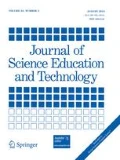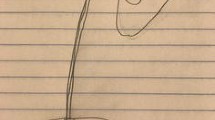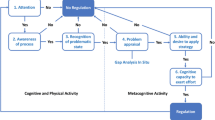Abstract
While a body of research exists on individual metacognition, research on reflective communities is just beginning. This study generated a framework for conceptualizing metacognition in groups by describing likely components of group metacognition. I focused on a group of five preservice science teachers engaged in problem-based learning (PBL). The purpose of the PBL course was to help students gain useful concepts from the learning sciences to apply to teaching. I investigated forms of metacognition and the role reflective discourse played during the learning process. The group and facilitator were videotaped during PBL sessions. A segment of video to study further was identified through interaction analysis. I analyzed the discourse of this segment of the transcribed group discussion, and I examined the group’s final paper. Supplementary data sources included the interaction analysis transcript of the full 8-h videotape and, specifically, the comments the group made about the resources they used to solve the problem. Categories of group metacognition were identified, claims proposed, and recombined or rejected until saturation. I identified three components of group metacognition that helped the group members solve the instructional redesign problem: (1) metasocial awareness about other member’s expertise, (2) monitoring of understanding, and (3) monitoring of process. Future research directions and instructional implications are discussed.
Similar content being viewed by others
References
Anderson D, Nashon SM (2007) Predators of knowledge construction: interpreting students’ metacognition in an amusement park physics program. Sci Educ 91:298–320
Anderson D, Nashon SM, Thomas GP (2009) Evolution of research methods for probing and understanding metacognition. Res Sci Educ 39(2):181–195
Arzt A, Armour-Thomas E (1992) Development of a cognitive-metacognitive framework for protocol analysis of mathematical problem solving in small groups. Cogn Instr 9:137–175
Atkinson JM, Heritage J (1984) Jefferson’s transcript notation. In: Atkinson JM, Heritage J (eds) Structures of social action: studies in conversation analysis. Cambridge University Press, Cambridge
Baird JR (1991) The importance of reflection in improving science teaching and learning. J Res Sci Teach 28(2):163–182
Barron B (2000) Achieving coordination in collaborative problem-solving groups. J Learn Sci 9(4):403–436
Barrows HS (1988) The tutorial process. Southern Illinois University, Illinois, pp 15–69
Barrows HS (1996) Problem-based learning in medicine and beyond: a brief overview. In: Wilkerson L, Gijselaers WH (eds) Bring problem-based learning to higher education: theory and practice. New Dir Teach Learn, vol 68, pp 3–12
Beaty WJ (2000) Static electricity misconceptions. [On-line]. http://www.eskimo.com/~billb/emotor/stmiscon.html
Bereiter C (2002) Education and mind in the knowledge age. Lawrence Erlbaum Associates, Mahwah, NJ
Brown AL (1987) Metacognition, executive control, self-regulation, and other more mysterious mechanisms. In: Weinert FE, Kluwe RH (eds) Metacognition, motivation, and understanding. Lawrence Erlbaum Associates, Hillsdale, pp 65–116
Chi MTH, Bassock M (1989) Learning from examples via self-explanations. In: Resnick LB (ed) Knowing, learning, and instruction: essays in honor of Robert Glaser. Erlbaum, Hillsdale, pp 251–282
Chi MTH, Siler SA, Jeong H, Yamauchi T, Hausmann RG (2001) Learning from human tutoring. Cogn Sci 25:471–533
Chin C, Brown DE (2000) Learning in science: a comparison of deep and surface approaches. J Res Sci Teach 37(2):109–138
Collins A, Brown JS, Newman SE (1989) Cognitive apprenticeship: teaching the crafts of reading, writing, and mathematics. In: Resnick LB (ed) Knowing, learning, and instruction: essays in honor of Robert Glaser. Lawrence Erlbaum Associates, Hillsdale, pp 453–494
Cooke NJ, Salas E, Kiekel PA, Bell B (2004) Advances in measuring team cognition. In: Salas E, Fiore SM (eds) Team Cognition: understanding the factors that drive process and performance. American Psychological Association, Washington, DC, pp 83–106
Davis EA (2006) Characterizing productive reflection among preservice elementary teachers: seeing what matters. Teach Teach Educ 22(3):281–301
Derry SJ, Siegel M, Stampen J, STEP* (2002) The STEP system for collaborative case-based teacher education: design, evaluation and future directions. In: Stahl G (ed) Computer support for collaborative learning: foundations for a CSCL community. Erlbaum, Mahwah, NJ, pp 209–216 (*Steinkuehler CA, Hmelo C, Spiro R, Woods D, Street J, Sung Y-K, DelMarcelle M, Seymour J, Feltovich P, Feltovich J, Koo H)
Derry SJ, Seymour J, Steinkuehler C, Lee J, Siegel MA (2003) From ambitious vision to partially satisfying reality: an evolving socio-technical design supporting community and collaborative learning in teacher education. In: Barab S, Kling R, Gray J (eds) Designing virtual communities in the service of learning. Cambridge University Press, New York, pp 256–295
Dods RF (1997) An action research study of the effectiveness of problem-based learning in promoting the acquisition and retention of knowledge. J Educ Gift 20:423–437
Engle RA, Conant FR (2002) Guiding principles for fostering productive disciplinary engagement: explaining an emergent argument in a community of learners classroom. Cogn Instr 20:399–484
Eylon BS, Ganiel U (1990) Macro-micro relationships: the missing link between electrostatics and electrodynamics in students’ reasoning. Int J Sci Educ 12:79–94
Fairclough N (1999) Linguistic and intertextual analysis in DA. In: Jaworski A, Coupland N (eds) The discourse reader. Routledge, London, p 310
Fischer G (2001) Communities of interest: learning through the interaction of multiple knowledge systems. Paper presented at the 24th Annual Information Systems Research Seminar In Scandinavia (IRIS’24), Ulvik, Norway
Fischer G (2005) From reflective practitioners to reflective communities. In: Proceedings of HCI international conference (HCII) (CD). Las Vegas
Flavell JH (1979) Metacognition and cognitive monitoring: a new area of cognitive-developmental inquiry. Am Psychol 34:906–911
Flower L (2000) The rival hypothesis stance and the practice of inquiry. In: Flower L, Long E, Higgins L (eds) Learning to rival: a literate practice for intercultural inquiry. Erlbaum, Mahwah, NJ, pp 27–48
Fox B (1993) The human tutorial dialogue project. Lawrence Erlbaum, Hillsdale, NJ
Gallagher SA, Stepien WJ, Sher BT, Workman D (1995) Implementing problem-based learning in science classrooms. Sch Sci Math 95(3):136–146
Goldberg F, Otero V (2003) The roles of laboratory and computer and simulator experiments in helping students develop a conceptual model of static electricity. In: Psillos D, Kariotoglou P, Tselfes V, Hatzikraniotis E, Bisdikian G, Kallery M, Fassoulopoulos G (eds) Science education research in the knowledge based society. Kluwer, Dordrecht
Goos M, Galbraith P (1996) “Do it this way!” Metacognitive strategies in collaborative mathematical problem solving. Educ Stud Math 30:229–260
Goos M, Galbraith P, Renshaw P (2002) Socially mediated metacognition: creating collaborative zones of proximal development in small group problem solving. Educ Stud Math 49:193–223
Gutwill J, Frederiksen J, White B (1999) Making their own connections: students’ understanding of multiple models in basic electricity. Cogn Instr 17(3):249–282
Hewson PW, Beeth ME, Thorley NR (1998) Teaching for conceptual change. In: Fraser BJ, Tobin KG (eds) International handbook of science education. Kluwer, Great Britain, pp 199–218
Hmelo CE, Williams SM (1998) Special issue: learning through problem solving. J Learn Sci 7
Hung W, Jonassen D, Liu R (2008) Problem based learning. In: Spector JM, Merrill MD, van Merrienboer J, Driscoll MP (eds) Handbook of research on educational communications and technology. Taylor & Francis, New York, pp 486–498
Johnson D, Johnson R (1999) Making co-operative learning work. Theory Pract 38(2):67–73
Jonassen DH (2000) Toward a design theory of problem solving. Educ Tech Res Dev 48(4):63–85
Jordan B, Henderson A (1995) Interaction analysis: foundations and practice. J Learn Sci 4(1):39–103
Kerr NL, Tindale RS (2004) Group performance and decision making. Annu Rev Psychol 55:623–655
Lemke JL (1990) Talking science: language, learning, and values. Albex Publishing, Norwood, pp 190–192
Levine JM, Moreland RL (1991) Culture and socialization in work groups. In: Resnick LB, Levine JM, Teasdale SD (eds) Perspectives on socially shared cognition. American Psychological Association, Washington, DC, pp 257–279
Levine JM, Resnick LB, Higgins ET (1993) Social foundations of cognition. Annu Rev Psychol 44:585–612
Lin X, Schwartz DL, Hatano G (2005) Teachers’ adaptive metacognition. Educ Psych 40(4):245–255
Lincoln YS, Guba EG (1985) Establishing trustworthiness. In: Lincoln YS, Guba EG (eds) Naturalistic inquiry. Sage, Newbury Park, pp 289–331
Lohman MC, Finkelstein M (2000) Designing groups in problem-based learning to promote problem-solving skill and self-directedness. Instr Sci 28:291–307
Loughran JJ (1996) Developing reflective practice: learning about teaching and learning through modelling. Falmer Press, London
Martin KJ, Chrispeels JH, D’eidio-Caston M (1998) Exploring the use of problem-based learning for developing collaborative leadership skills. J Sch Leadersh 8:470–500
Marzano RJ, Kendall JS (2007) The new taxonomy of educational objectives. Corwin Press, Thousand Oaks
Mayo P, Donnelly MB, Nash PP, Schwartz RW (1993) Student perceptions of tutor effectiveness in a problem-based surgery clerkship. Teach Learn Med 5(4):227–233
National Research Council (1996) The national science education standards. National Academy Press, Washington, DC
NCES (1996) Issue brief: are high school teachers teaching core subjects without college majors or minors in those subjects? (Ingersoll, R.) (NCES 96-839) [On-line]. http://nces.ed.gov/pubs/96839.html 7/24/2000
Newble DI, Clarke RM (1986) The approaches to learning of students in a traditional and in an innovative problem-based medical school. Med Educ 20:267–273
Oberlander J, Talbert-Johnson C (2004) Using technology to support problem-based learning. Action Teach Educ 25(4):48–57
O’Donnell A, Derry SJ (2005) Cognitive processes in interdisciplinary groups: problems and possibilities. In: Derry SJ, Schunn CD, Gernsbacher MA (eds) Interdisciplinary collaboration: an emerging cognitive science. Lawrence Erlbaum Associates, Mahwah
Olson GM, Olson JS (2001) Distance matters. In: Carroll JM (ed) Human–computer interaction in the new millennium. ACM Press, New York, pp 397–417
Otero VK, Johnson A, Goldberg F (1999) How does the computer facilitate the development of physics knowledge by prospective elementary teachers? J Educ 181(2):57–89
Paavola S, Lipponen L, Hakkarainen K (2004) Models of innovative knowledge communities and the three metaphors of learning. Rev Educ Res 74:557–577
Radinsky J (2000) A framework for studying students’ development of reflective inquiry dispositions. Unpublished doctoral dissertation, Northwestern University
Saha PK (1984) Bengali. In: Chisholm WS, Milic LT, Greppin JAC (eds) Interrogativity: a colloquium on the grammar, typology, and pragmatics of questions in seven diverse languages. John Benjamin, Philadelphia
Schoenfeld AH (1985) Mathematical problem solving. Academic Press, Orlando
Schoenfeld AH (1999) Looking toward the 21st century: challenges of educational theory and practice. Educ Res 28(7):4–14
Schön DA (1983) The reflective practitioner: how professionals think in action. Basic Books, New York
Shulman LS (1987) Knowledge and teaching: foundations of the new reform. Harv Educ Rev 57(1):1–22
Siegel MA, Lee JA-C (2001) “But electricity isn’t static:” science discussion, identification of learning issues, and use of resources in a problem-based learning education course. Paper presented at the annual meeting of the National Association for Research in Science Teaching, St. Louis, MO
Stigler JW, Gallimore R, Hiebert J (2000) Using video surveys to compare classrooms ad teaching across cultures: examples and lessons from the TIMSS video studies. Educ Psychol 35(2):87–100
Valli L (1997) Listening to other voices: a description of teacher reflection in the United States. Peabody J Educ 72(1):67–88
van Zee EH, Minstrell J (1997) Reflective discourse: developing shared understandings in a high school physics classroom. Int J Sci Educ 19:209–228
Webb NM, Mastergeorge A (2003) The development of student’s learning in peer-directed small groups. Cogn and Instr 21(4):361–428
Webb NM, Nemer KM, Ing M (2006) Small-group reflections: parallels between teacher discourse and student behavior in peer-directed groups. J Learn Sci 15(1):63–119
Wegner E (2000) Communities of practice and social learning systems. Organization 7:225–246
White B, Frederisken J (2005) A theoretical framework and approach for fostering metacognitive development. Educ Psychol 40:211–223
Woods DR (1996) Problem-based learning for large classes in chemical engineering. New Dir Teach Learn 68:91–99
Zohar A (1999) Teachers’ metacognitive knowledge and the instruction of higher order thinking. Teach Teach Educ 15:413–429
Acknowledgments
This research was a long-term effort! I would especially like to thank Sharon Derry and the Secondary Teacher Education Project, Julia Lee, and Jenna Seymour, who were critical to this work. I also gratefully acknowledge: the UC Berkeley writing support group, Erin Olkowski, Joshua Gutwill-Wise, Michael Schneider, Steve Peterson, Constance Steinkuehler, William Beaty, John Rudolph, and the student teachers, mentors, and facilitators from the Educational Psychology course.
Author information
Authors and Affiliations
Corresponding author
Electronic supplementary material
Below is the link to the electronic supplementary material.
Rights and permissions
About this article
Cite this article
Siegel, M.A. Filling in the Distance Between Us: Group Metacognition During Problem Solving in a Secondary Education Course. J Sci Educ Technol 21, 325–341 (2012). https://doi.org/10.1007/s10956-011-9326-z
Published:
Issue Date:
DOI: https://doi.org/10.1007/s10956-011-9326-z




